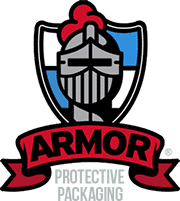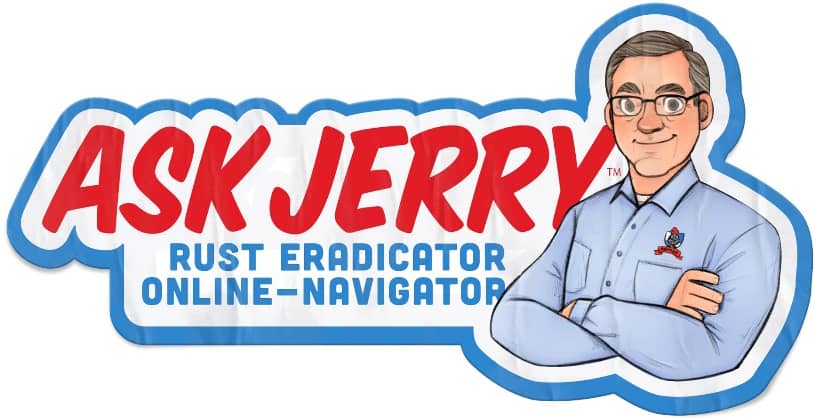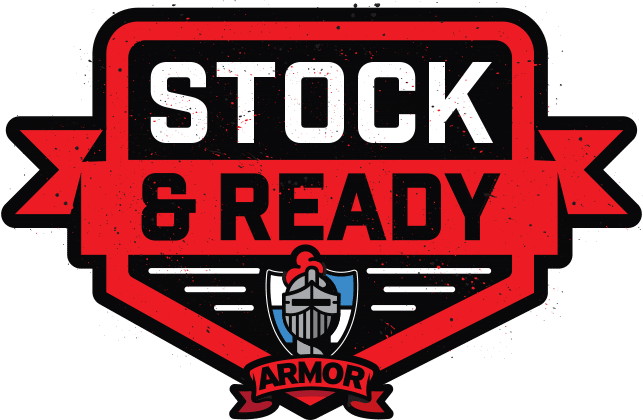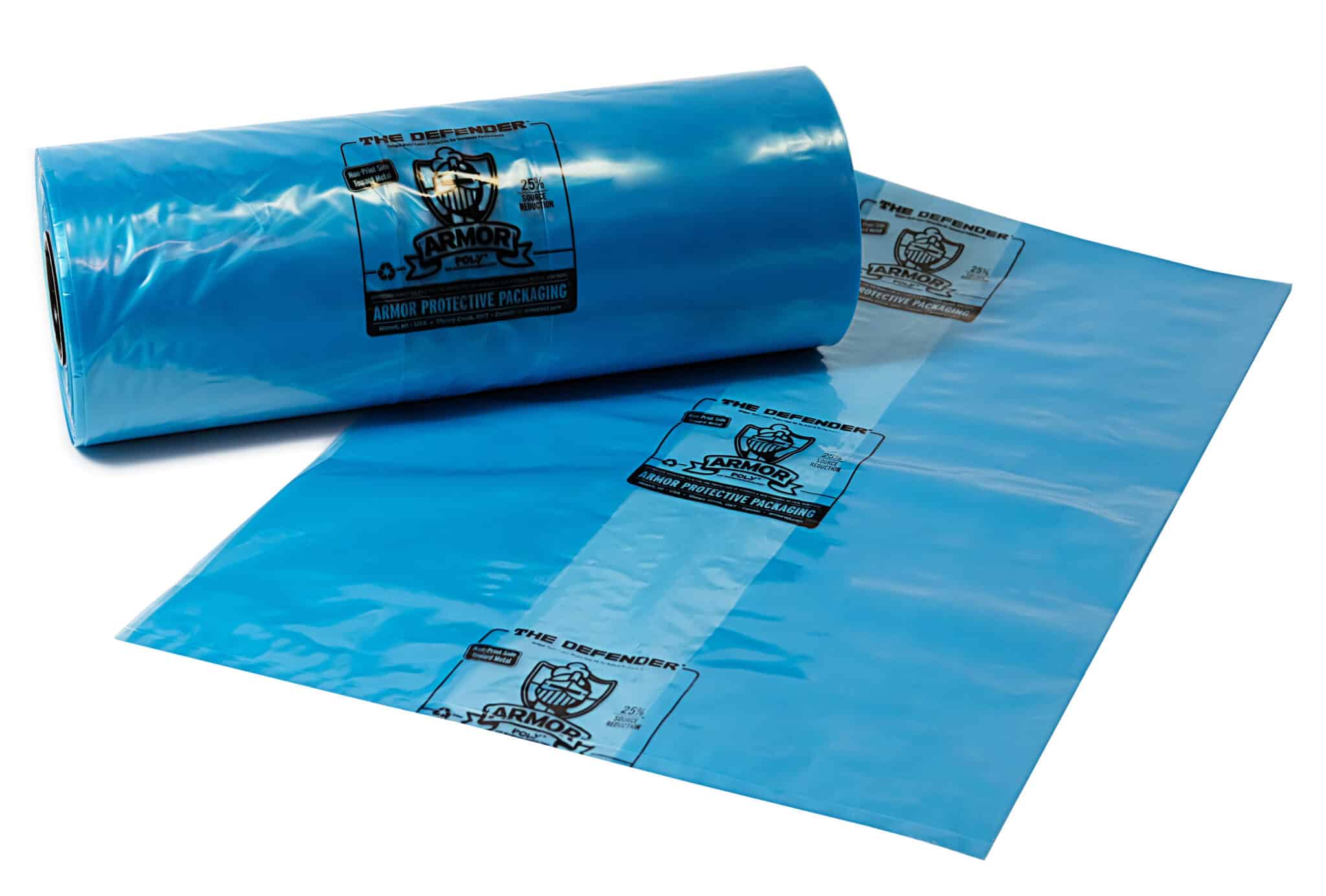VCI stands for vapor corrosion inhibitor technology and in a nutshell, it’s the “secret sauce” we infuse into our products — primarily packaging materials like paper or poly film — to fight off the unwanted advances of rust. VCI is a class of chemical compounds that emit rust-inhibiting vapors into an enclosed air space. When metal is present, the VCI molecules form a nano-sized layer of protection on the surface of ferrous and non-ferrous metal that displaces moisture and prevents corrosion. At ARMOR, we make the analogy that VCI vapors knit together to form an invisible blanket that covers the surface of metal to shield it from moisture and the damaging effects of rust and corrosion.
ARMOR engineered highly-specialized vapor corrosion inhibitors to create its unique VCI formulation called ARMOR VCI Nanotechnology. This “secret recipe” of VCI forms a rust-resistant protective shield on the surface of metal that is only a few molecules thick called a “nanocoating.”
Nanotechnology is described as the imaging, measuring, modeling and manipulation of matter in extremely small sizes of between 1 and 100 nanometers. To illustrate just how small a nanometer is, consider these examples:
- One strand of human hair is between 80,000 and 100,000 nanometers wide.
- A sheet of loose-leaf paper is approximately 100,000 nanometers thick.
- The head of a pin is 1 million nanometers across.
- An ant is 5 million nanometers long.
ARMOR VCI Nanotechnology protects metal in ways that traditional oil and grease rust prevention methods can’t – it delivers a clean, dry ultra-thin and ultra-strong layer of protection on the surface of metal that is only 4-to-6 nanometers thick. The VCI molecules form a hydrophobic (aka, water-repelling) barrier that keeps dirt, water, moisture and other corrosion-causing contaminates away from metal. ARMOR’s VCI formulation forms a layer of protection that is undetectable and that does not alter metal properties — it does not change the look, weight or feel of metal parts; it does not compromise metal surface coatings or treatments; and it leaves metal parts ready for immediate use without cleaning or degreasing.
When you wrap or enclose a metal part in an ARMOR VCI product, VCI vapors are released and they attach themselves to the surface of metal to form a nano-sized layer of protection that repels water, moisture and other contaminates that cause corrosion. Traditional rust preventatives such as oil and grease offer a physical barrier to protect the surface of metal parts, but they are messy, time consuming to apply and remove, and are harmful to humans and the environment. Vapor corrosion inhibitors (VCI), such as ARMOR VCI Nanotechnology, work on a molecular level and they are clean, dry, easy-to-apply, and VCI protection dissipates once metal part is removed from VCI packaging, which eliminates the need for removal.
ARMOR combines it proprietary VCI Nanotechnology with materials such as Kraft paper, poly film, chipboard or foam pad to create clean and dry packaging materials with the added benefit of rust prevention. We infuse VCI into the packaging materials and manufacture them into rolls, sheets, VCI bags or tubing. When metal/metal parts are wrapped or covered in VCI sheets or enclosed in VCI bags or tubing and placed in an enclosed container for storage or shipping, the VCI vapors release and form a protective layer on the surface of metal that repels rust.
When used properly, ARMOR VCI can protect metal parts for years. The VCI length of protection varies based on factors such as temperature and humidity, airflow, production and process methods, the surface conditions of metal parts and whether VCI products are stored properly before their use. ARMOR offers a range of VCI products to protect a variety of metals and specific packaging requirements and ARMOR VCI products can also be combined or used together to extend the length of protection or to enhance the level of protection for more extreme conditions.
ARMOR VCI packaging materials are clean, safe and easy. ARMOR’s VCI formulations are considered safe from causing serious harm. When used as directed, ARMOR VCI products are safe to handle and once the VCI packaging is removed, the VCI can dissipate from the metal surface without risk of contact or inhalation. ARMOR strongly recommends that users follow the specific usage guidelines for handling and applying each VCI product to ensure users are safe.
Corrosion is the natural mechanism by which metal returns to its original state of ore. If metal is exposed to moisture/water and oxygen, it breaks down and corrodes. Corrosion of metal is an electro-chemical process. The flow of electrons from high-energy areas of metal to low energy areas takes place through a solution on the surface of the metal, capable of supporting corrosion. Corrosion will not take place without a conducting solution called an electrolyte – this conducting solution is caused by water, rain, moisture, and humidity. As little as 65% relative humidity will form an electrolyte, which can cause corrosion.
Nitrites are used in VCI in the form of sodium nitrite. Sodium nitrite has been used as a food preservative for over 100 years. It is found in the bacon you eat for breakfast and the salami you eat for lunch. It has been approved as a food additive for over two-thirds of a century. In fact, over 85% of the sodium nitrite present in our body is produced by our own body. In order to consume the MSDS reported hazardous dosage of sodium nitrite, for a normal VCI at 1.0 g/sq. ft. a person would have to EAT all of the sodium nitrite present in 31 sq. ft. of VCI treated paper. Not only does a person not ingest VCI paper, but rarely comes into contact with it, given the fact that workers should wear gloves to avoid the acidity that our fingerprints give off on the metal surfaces.
Similar to most ordinary household chemicals, sodium nitrite is not without risk. It simply must be handled in the same judicious fashion as such ordinary chemicals as household bleach, windshield washer fluid, floor wax, and several others. None of these components would be considered as “hazardous” within normal usage; however, sodium nitrite is often singled out as if it is. While sodium nitrite in VCI Paper should not be construed in the same light as a food preservative, it is not the lethal enemy that some make it out to be. It is used in the VCI industry because it is an excellent inhibitor of rust, especially for steel products. Armor Protective Packaging® manufactures several different VCI products, with and without sodium nitrite. Please contact an ARMOR representative for information and help in specifying the correct product(s) for your application.
VCI paper — such as ARMOR WRAP® VCI paper — is a neutral pH Kraft paper that is infused with VCI and is manufactured in sheets or rolls. When compared to VCI poly film, VCI paper has a faster diffusion rate – paper releases VCI faster, which allows VCI to form its protective shield on the surface of metal parts more quickly. That is not to say that VCI poly – such as ARMOR POLY® VCI film – is not an excellent rust preventative or that it does not have its place. VCI poly, which is a polyurethane film with added VCI that has been manufactured in rolls, sheets, bags, tubing and shrink film, offers strong, moisture barrier properties and provides a physical barrier to protect metal from dust and contaminants. While VCI paper diffuses VCI more quickly, VCI poly offers a greater level of barrier protection. Both have their advantages depending on the environment that metal is being shipped or stored in.
Ferrous metals contain iron and while they are known to be durable and strong, they also have a high carbon content that makes them more susceptible to rust. Examples of ferrous metals include steel, carbon steel and cast iron. Non-ferrous metals do not contain iron and they are known to be malleable, lightweight and less likely to rust. Examples of non-ferrous metals include aluminum, copper, brass, gold, silver and lead.
VCI and desiccants protect metal parts in very different ways using very different chemistry. One way to explain their differences is using a give-and-take analogy. ARMOR’s proprietary VCI Nanotechnology “gives” or emits a vapor that prevents corrosion by forming a protective layer on the surface of metal. Desiccants are drying agents that “take” or adsorb moisture from the packaging environment, which is one of the main causes of corrosion. Depending on the application and the particulars of the storage or shipping environment, one method may provide better results than the other or, VCI and desiccants are often used together to provide premium protection of metal parts in highly-demanding packaging environments.
In 2019, ARMOR formally combined VCI and desiccant together to create its SMARTY PAK™. The SMARTY PAK design not only emits ARMOR VCI Nanotechnology, it uses a specialty desiccant that adsorbs moisture faster than traditional desiccants and holds on to the moisture even at high temperatures. SMARTY PAKs are available in three sizes, they deliver multi-metal protection, and they are non-dusting and lint-free making them ideal for use in applications where fibrous packaging materials are not allowed.
VCI paper — such as ARMOR WRAP® VCI paper — is a neutral pH Kraft paper that is infused with VCI chemistry and is manufactured in sheets or rolls with the option to add barrier coatings such as wax or poly for increased protection against moisture, grease/oils or a scrim coating for added durability and tear resistance. ARMOR WRAP is also available in different formulations including global, multi-metal protection and military-approved. The key advantages of ARMOR WRAP VCI paper are:
- Fast diffusion rate – paper releases VCI faster, which allows VCI to form its protective shield on the surface of metal parts more quickly.
- ARMOR WRAP VCI paper is environmentally safe and fully recyclable and repulpable.
- Flexible packaging material that easily forms around various sizes/shapes of metal parts.
- ARMOR embeds VCI on BOTH sides of its ARMOR WRAP paper to simplify and foolproof its use.
- Combines easily with other VCI products to protect metal parts in extreme conditions.
- More than 50 years in existence with long-standing use by the United State Military.
ARMOR WRAP VCI paper is infused with VCI on BOTH sides of the paper (different from the one-sided format manufactured by most VCI companies) to eliminate confusion as to which side of the paper to place against metal part when wrapping and to enhance interleaving capabilities within a pallet of metal parts. The result is less paper, less waste and less cost.
VCI Poly – such as ARMOR POLY® VCI film — is a polyurethane film with added VCI chemistry that has been manufactured in rolls, sheets, bags, tubing and shrink film for use in packaging and protecting metal parts from rust and corrosion. The key advantages of ARMOR POLY VCI film are:
- Provides a strong, moisture barrier in addition to its VCI corrosion inhibitor.
- Ease of use – metal parts are placed into an ARMOR POLY VCI bag or a shipping/storage container lined with a VCI poly bag and closed – ARMOR POLY is also heat sealable.
- Provides a physical barrier to protect metal/metal parts from dust and contaminants — often a customer is already using a poly bag for this purpose. Using an ARMOR POLY® VCI bag provides the same protection with the added benefits of rust prevention.
- Translucency of film allows for simple identification and inspection of contents without removal.
- ARMOR POLY VCI films contain ARMOR’s Bright Idea Technology™ — under a black light they emit glowing visible proof that VCI is present.
- Combines easily with other VCI products to protect metal parts in extreme conditions.
Corrugated cardboard is made from paper. An early step in the method for making paper involves treating raw wood with chemicals to break it down into a fibrous pulp – it is an acidic process and it can leave an acidic residue on cardboard. One characteristic of corrugated cardboard is it is absorbent and when it absorbs water/moisture it causes the acidic residue to activate. If metal or metal parts in storage or transit are placed directly on or near damp corrugated cardboard, the moisture and acidity will induce corrosion on the surface of metal parts. Placing ARMOR VCI products between metal and corrugated cardboard will prevent corrosion and keep metals clean and rust-free.
Diverse needs call for diverse solutions. That is why ARMOR offers over 12 types of ARMOR WRAP® papers to choose from for your specific VCI needs. Some VCI manufacturers incorrectly claim that a single formulation will protect everything from steel to copper, others are vague or cannot tell you how much VCI is actually in the product. The fact is no single VCI formulation for paper can provide true corrosion-free protection for all metals and applications.
Due to the abundance of metals available, as well as the numerous coolants, washes, rust preventative oils and other substances used within a manufacturing process, it is important to check VCI compatibility with these substances. While it is rare, on occasion there may be factors that either react adversely with a particular VCI formula or react to diminish the performance of an ARMOR VCI product.
Metal parts are manufactured in different sizes, shapes and metal compositions. In addition, they are exposed to a variety of environmental conditions and vary greatly in the length of protection they require. VCI is not a one size fits all formulation or product and for that reason, ARMOR offers a wide range of VCI products to keep metal rust-free. ARMOR WRAP® VCI paper, ARMOR POLY® VCI film, chip board, foam pad, emitters and liquids are designed to ensure that metal is protected from corrosion while in process, in storage or in shipping/transport.
It is not required but, the more airtight the packaging the more effective the VCI protection. To optimize the rust-prevention benefits of VCI, airtight packaging is recommended. If packaging is less than airtight, VCI can protect metal parts but its effectiveness will be reduced. What is most important when using VCI packaging is keeping VCI vapors contained as much as possible — the more airtight the enclosure the more effective the VCI protection will be. Conversely, if the packaging is not airtight and the VCI vapors are able to escape, the strength of the VCI (and its ability to protect metal parts from rust) will diminish.
ARMOR carries a variety of military-approved papers that are listed on the U.S. Department of Defense Qualified Products List (QPL). These products are tested in accordance with, and labeled as, required in the Military specification MIL-PRF-3420 (Wrapping Materials, Volatile Corrosion Inhibitor Treated, Opaque).
Human hands contain moisture and acidity that can be directly transferred onto metal parts and ultimately, cause corrosion. To prevent the transfer of moisture, acidity and other contaminants, employees must wear gloves when handling metal parts. The use of clean, cotton gloves (replaced once dirty), is essential to reducing overall rust and corrosion within the manufacturing process.
ARMOR offers full-service, in-house, accelerated corrosion testing at NO CHARGE to its customers. We use two, distinct methods to subject metal parts to accelerated conditions–a humidity chamber controlled at 98°F – 105°F and maintaining a relative humidity of 95 – 99% and traditional ovens with humidity features.
- Cost-effective protection
- Clean, dry packaging that is easy-to-apply
- Safe for people and the environment
- Flexible packaging materials easily form around differing sizes/shapes of metal parts
- Vapors penetrate hard-to-reach areas and replenish inside enclosure
- No messy grease, oils, or surface preparation required
- No need to remove VCI – metal parts can be used immediately
- Eliminates labor and cost of hazardous waste disposal
- Can provide years of corrosion protection
The ARMOR Stock & Ready® Program was designed to bring the ease and convenience of online shopping that we experience in our personal lives to the world of rust prevention/rust removal products. ARMOR tripled its in-stock inventory, simplified order placement to include no order minimums, and implemented quick processing and turbo-fast shipping to establish the ARMOR Stock & Ready Program where all rust prevention/rust removal products on our stock list are in-stock and ready-to-ship.
- Your parts should be clean and free from corrosion before packaging
- Package clean parts as soon as possible after processing, manufacturing or cleaning
- Use gloves when handling parts to eliminate corrosion caused by fingerprints.
In our more than 40 years in business, ARMOR has never been contacted regarding an issue with VCI compatibility to non-metallic surfaces such as plastics, rubbers or wood. However, since there are so many possible combinations of ingredients, processes and types of these substrates it is impossible to guarantee their suitability with ARMOR VCI. Without question, rust prevention methods such as oils, greases and other liquid RPs (rust preventatives) have a much higher likelihood of reacting with plastics, rubbers and wood, but ARMOR strongly recommends a check of VCI compatibility with these substances for each application due to the complexity and number of plastics, rubber materials and woods in the marketplace.
With ARMOR VCI Nanotechnology, you will not see or feel any film, coating or finish on metal parts because our VCI delivers a clean, dry ultra-thin and ultra-strong layer of protection on the surface of metal that is only 4-to-6 nanometers thick. ARMOR’s VCI formulation forms a layer of protection that is undetectable and that does not alter metal properties — it does not change the look, weight or feel of metal parts; it does not compromise metal surface coatings or treatments; and it leaves metal parts ready for immediate use without cleaning or degreasing.
- Metal parts should be clean and free from corrosion before
- Metal parts should be thoroughly dry to eliminate moisture in the packaging.
- Gloves should always be worn when handling metal parts to prevent the transfer of moisture, acidity and other contaminants from hands/fingerprints.
- Package metal parts as soon as possible after processing, manufacturing or cleaning.
Keep VCI products in original and/or tightly-sealed packaging that is stored inside and away from the elements. For best results, do not leave ARMOR VCI product out in an open environment, either indoors or outdoors. Keep VCI product in airtight plastic packaging to preserve VCI and to protect product from contamination due to water, moisture, dirt, debris, etc… Store VCI products under shelter, securely inside a shipping carton, external bag, box or container and out of direct sunlight.
ARMOR can tell you exactly how much VCI is contained in our products to give your products the added insurance they need to remain corrosion free. For example, our papers contain a specified and measured amount of VCI additive, as measured in grams/square foot. This ability to monitor and control the amount is a testament to our quality and continued improvement. If a company cannot specify and consistently meet a given coating weight of VCI on a substrate, one runs the risk of having too little VCI to get the job done.
Armor Protective Packaging® corrosion management products provide approximately three years of protection for metal parts and surfaces when used properly in normal warehouse conditions. To ensure successful results, parts must be completely wrapped or enclosed – airtight packaging is the most effective for best results and longest protection time. Variable conditions such as temperature and humidity extremes, airflow, production and process methods, surface conditions of metal to be protected, customer employee training and other factors are impossible for ARMOR to control so it is impossible to guarantee a specific length of protection. Contact your ARMOR representative for details related to your specific application.
ARMOR uses a special mathematical formula for calculating the proper size VCI bag/bin liner/pallet cover to effectively protect metal parts. Not only is it important that the VCI bag is large enough to completely cover metal parts, but allowances must be given to ensure the VCI bag also has ample overage to allow for proper tie off and sealing. Insufficient overage can result in faulty seals and that can allow moisture to enter the bag while at the same time allowing VCI to escape. Accurate bag sizing and proper seals are critical in export where temperature fluctuations and transport handling conditions can be extreme.
ARMOR VCI products are not recommended for re-use for three primary reasons:
- There is no way to determine the rate at which the VCI has volatilized out of the product and conversely, there is no way to determine how much VCI remains in the product for re-use.
- It is impossible to properly track or monitor the amount of time and/or environmental conditions that the VCI product has been exposed to in previous uses to verify if it is still effective.
- Re-use of a VCI product allows the potential for contaminants on or in the VCI packaging to be transferred.
For those instances when re-use is necessary, be sure VCI is like your favorite pair of jeans — clean, dry, free of tears, holes, or other contaminants. It is also important to note that the length of time the packaging material has been exposed to the environment (especially high heat/humidity) will greatly impact the VCI’s effectiveness. Do not re-use VCI packaging more than two times and note, ARMOR cannot guarantee the amount of VCI that remains in the packaging or substrate upon re-use.
It’s widely known that recycling helps to reduce the pollution caused by waste, it reduces the use of raw materials and it positively impacts the environment. ARMOR WRAP VCI paper and ARMOR POLY VCI film are fully recyclable. In addition, ARMOR utilizes recycled content in the manufacture of its VCI products whenever possible and we do it without sacrificing performance or raising price.
Moisture both causes and accelerates rust and corrosion. Metal parts should be completely dry before ARMOR VCI packaging is applied.
We have identified four key factors within a manufacturing process that will help to increase the effectiveness of ARMOR VCI packaging and reduce corrosion:
- Metal parts should be clean and free from corrosion before
- Metal parts should be thoroughly dry to eliminate moisture in the packaging.
- Gloves should always be worn when handling metal parts to prevent the transfer of moisture, acidity and other contaminants from hands/fingerprints.
- Package metal parts as soon as possible after processing, manufacturing or cleaning.
Oil, lubricants, and/or transmission fluids typically do not have any adverse effects when used in combination with VCI other than they inhibit the full potential of the VCI. ARMOR VCI was developed to be used on parts that are clean and dry (free of RPs and oils). If parts are coated with these types of liquids, the VCI may not be able to penetrate through the coatings to get to the metal surfaces. ARMOR VCI, will however, protect recessed areas or other areas where the oil/lubricant/transmission fluid is not, thereby guarding against corrosion in that regard. ARMOR recommends lab testing if there is concern regarding compatibility.
ARMOR VCI products are available for purchase both through industrial packaging distributors and the ARMOR Stock & Ready® Program. Our Stock & Ready program was designed to bring the ease and convenience of online shopping that has become commonplace in our personal lives to the world of rust prevention/rust removal products. ARMOR tripled its in-stock inventory, simplified order placement to include no order minimums, and implemented quick processing and turbo-fast shipping to establish the ARMOR Stock & Ready Program where all rust prevention/rust removal products on our stock list are in-stock and ready-to-ship.
For an authorized ARMOR distributor nearest you, please contact Armor Protective Packaging® by phone, (517) 546-1117 or toll-free at (800) 365-1117, by fax, (248) 573-0241 or by email at info@armorvci.com.



